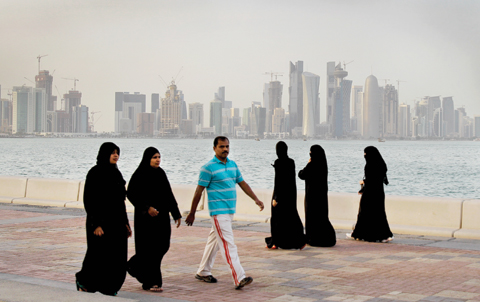Qatar Central Bank 'operating normally despite crisis'
 DOHA: With the new high-rise buildings of downtown Doha in the background, Qatari women and a man enjoy walking by the sea in Doha. — AP
DOHA: With the new high-rise buildings of downtown Doha in the background, Qatari women and a man enjoy walking by the sea in Doha. — APDUBAI: Qatar can easily defend its economy and currency against sanctions by other Arab states, Qatari finance minister Ali Sherif Al-Emadi told CNBC television in an interview broadcast yesterday.
He added that the countries which had imposed sanctions would also lose money because of the damage to business in the region. "A lot of people think we're the only ones to lose in this... If we're going to lose a dollar, they will lose a dollar also."
Saudi Arabia, the United Arab Emirates, Bahrain and Egypt cut diplomatic and transport ties a week ago, accusing Doha of backing terrorism. The sanctions have disrupted flows of imports and other materials into Qatar and caused many foreign banks to scale back their business with the country.
But Emadi said the energy sector and economy of the world's top liquefied natural gas exporter were essentially operating as normal and that there had not been a serious impact on supplies of food or other goods. Qatar can import goods from Turkey, the Far East or Europe and it will respond to the crisis by diversifying its economy even more, he told CNBC.
The Qatari riyal has come under pressure in the spot and forward foreign exchange markets, but Emadi said neither this nor a near 10 percent plunge in the local stock market was cause for concern.
"Our reserves and investment funds are more than 250 percent of gross domestic product, so I don't think there is any reason that people need to be concerned about what's happening or any speculation on the Qatari riyal."
Asked whether Qatar might need to raise money by selling off stakes in large Western companies held by its sovereign wealth fund, Emadi indicated this was not on the cards at present.
"We are extremely comfortable with our positions, our investments and liquidity in our systems," he said. Prices of Qatar's international bonds have dropped sharply, but in answer to another question, Emadi said he saw no need for the government to step into the market and buy those bonds to support prices.
No liquidity crisis
Qatar's Central Bank said yesterday banking transactions at home and abroad were continuing normally despite the diplomatic crisis which has seen several Gulf countries sever ties with the emirate. In a statement released on the state-run Qatar News Agency (QNA), Central Bank governor Sheikh Abdullah bin Saud Al-Thani dismissed concerns over liquidity levels. "The banking and banking transactions and procedures in the State of Qatar continue to be normal, both at the level of local financial transactions and between the Qatari banking sector and foreign banks," the statement read. It added that the governor "stressed that the liquidity levels in the Qatari banking sector are good and meet all customer requirements". Doha is seeking to reassure customers as it is gripped by the biggest diplomatic crisis to hit the region in years.
Qatar has found itself isolated following a decision last week by Saudi Arabia, the United Arab Emirates, Bahrain and others to cut ties with Doha over its support for "terrorism", a charge the emirate vehemently rejects. Saudi Arabia on June 5 sealed Qatar's only land border, and the country has been banned from using the airspace of both Saudi Arabia and the United Arab Emirates.
Qatari citizens have been ordered to leave the two countries within two weeks. The UAE has also ordered its banks to stop dealing with major Qatari lenders. Rumors have circulated in Doha that some exchanges have been hit by a shortage of dollars, potentially affecting remittances by Qatar's migrant workforce, estimated at more than two million people. The World Bank estimates that expat workers in Qatar sent home $11.4 billion (10.1 billion euros) in 2015. - Agencies










